Difference between revisions of "Sheep leather"
m |
|||
| Line 5: | Line 5: | ||
== Sheep leather== | == Sheep leather== | ||
| − | + | There are about 1.2 billion sheep and lambs in the world of which 15 to 25% are slaughtered annually. Sheep leather, [[lamb leather]] and [[Sheepskin - Lambskin|lambskin]] are second behind [[cow leather]] with about 10% of world production. 90% of the sheep are woolly sheep. The finer and denser the wool, the thinner and worse the [[leather quality]]. Sheep leather is used for [[Leather book cover|book covers]], [[leather clothing|clothing]], [[leather gloves|gloves]], [[leather accessories]] and occasionally for [[leather furniture|furniture]]. | |
| − | Italy is by far the largest [[leather production|producer]] of sheep and [[Goatskin|goat]] leather in Europe. Almost 34 million square | + | Italy is by far the largest [[leather production|producer]] of sheep and [[Goatskin|goat]] leather in Europe. Almost 34 million square metres of sheep and goat leather were produced in Italy in 2011. In the same period, almost 100 million square metres of [[cow leather|bovine leather]] were produced in Italy. Germany, the [[leather industry|third largest leather producer]] in Europe, after Spain, produces approximately 500,000 square metres of sheep and goat leather in the same year and approximately 8.5 million square metres of [[cow leather]]. |
| Line 24: | Line 24: | ||
<p> </p> | <p> </p> | ||
| − | Sheepskin | + | Sheepskin has a similar structure to [[goatskin]], but is less [[leather quality|resistant]]. Sheep are raised for the production of wool. There are countless varieties of skin with considerable differences in [[leather quality|skin quality]]. There can be considerable differences due to environmental conditions (climate, environment, food) even within the same breed. |
| Line 61: | Line 61: | ||
| − | A special method | + | A special method for increasing the [[Natural leather grain|grain structure]] of sheep leather is [[Shrunken leather - leather shrinkage|shrinkage]]. This is used in France, where the leather is called "Basane de Mouton". It is a [[vegetable-tanned leather]]. Sheepskins are selected with a [[Natural leather grain|strong grain]] at the neck, which is called "moutonage". It is similar to the neck leather from [[cow leather|cattle]]. |
Revision as of 17:21, 26 April 2017
Sheep leather
There are about 1.2 billion sheep and lambs in the world of which 15 to 25% are slaughtered annually. Sheep leather, lamb leather and lambskin are second behind cow leather with about 10% of world production. 90% of the sheep are woolly sheep. The finer and denser the wool, the thinner and worse the leather quality. Sheep leather is used for book covers, clothing, gloves, leather accessories and occasionally for furniture.
Italy is by far the largest producer of sheep and goat leather in Europe. Almost 34 million square metres of sheep and goat leather were produced in Italy in 2011. In the same period, almost 100 million square metres of bovine leather were produced in Italy. Germany, the third largest leather producer in Europe, after Spain, produces approximately 500,000 square metres of sheep and goat leather in the same year and approximately 8.5 million square metres of cow leather.
The hair pores in sheep leather.
For furniture, solid sheep leather with smooth surfaces are processed.
Sheepskin has a similar structure to goatskin, but is less resistant. Sheep are raised for the production of wool. There are countless varieties of skin with considerable differences in skin quality. There can be considerable differences due to environmental conditions (climate, environment, food) even within the same breed.
Furniture made of sheep leather is rare. Sheep leather furniture is then processed as patinated, porous aniline leather.
Typical sheep leather furniture.
A special method for increasing the grain structure of sheep leather is shrinkage. This is used in France, where the leather is called "Basane de Mouton". It is a vegetable-tanned leather. Sheepskins are selected with a strong grain at the neck, which is called "moutonage". It is similar to the neck leather from cattle.
shrunken sheep leather (www.brocantique.de).
Additional information









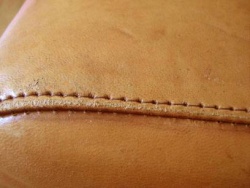
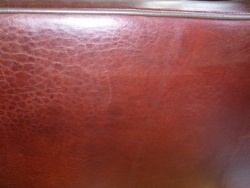
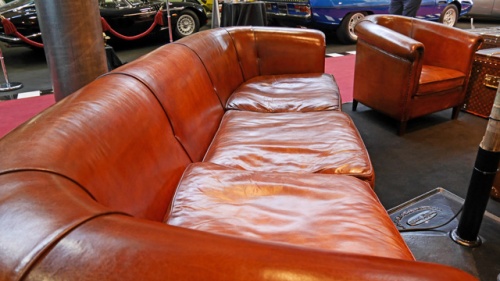
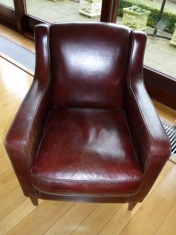
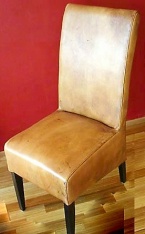
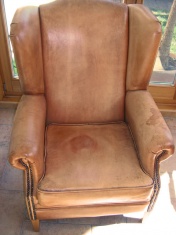
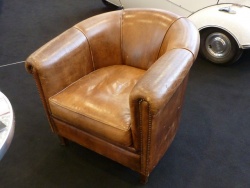
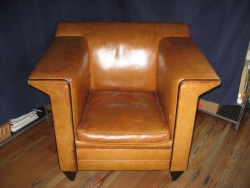
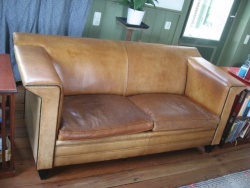
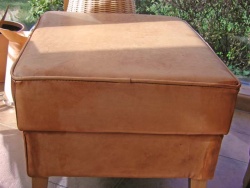
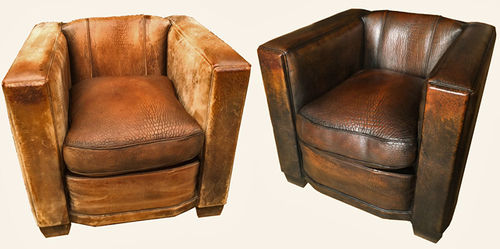

 a kotori web solution
a kotori web solution